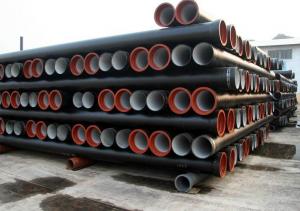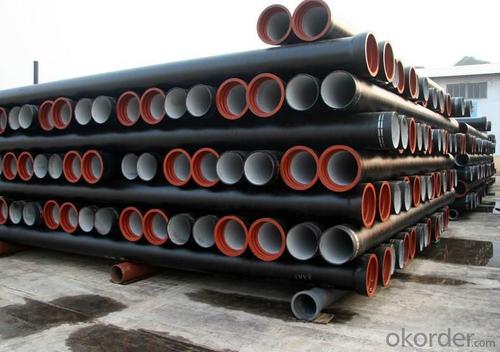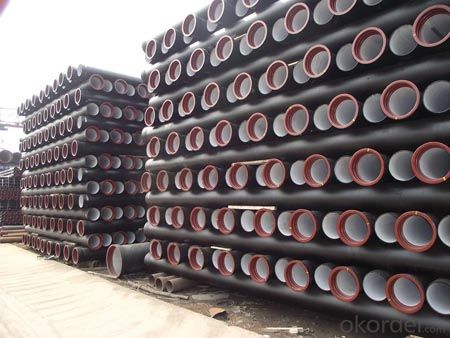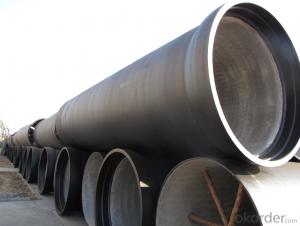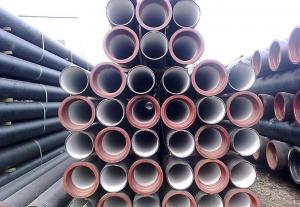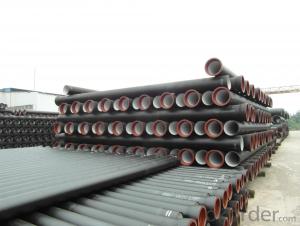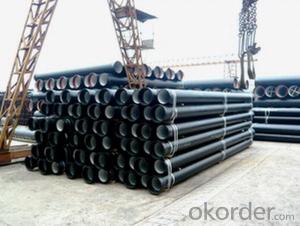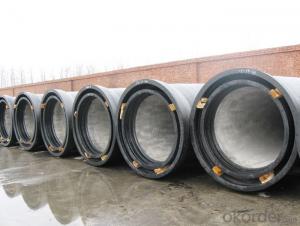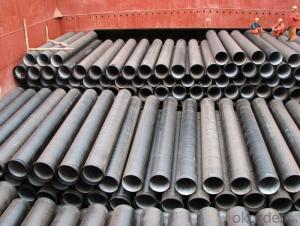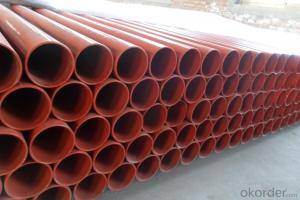Ductile Iron Pipe Class K7/K8/K9 ISO2531
- Loading Port:
- China main port
- Payment Terms:
- TT or LC
- Min Order Qty:
- 1000 m
- Supply Capability:
- 500000 m/month
OKorder Service Pledge
OKorder Financial Service
You Might Also Like
1. Ductile Iron Pipe Description :
It has high strength & hardnes as steel and better corrosin resistance than steerl and grey iron, I ductile iron pipe is the ideal substute for gray cast iron pipe and common steel pipe. In addition, our DI pipes are produced with good straightness, identical wall thickness, high dimension accuracy, smooth surface finished, remarkable mechanical properties and firmly sticking internal & external coating layer as well. Flexible Push-in joint and rubber gasket are used for more convenient installation of pipelines.
2. Ductile Iron Pipe Main Features:
- For potable water supply
- High strength
- Long lifespan
- Good corrosion resistance
- Easy installation
3.Ductile Iron Pipe Images:
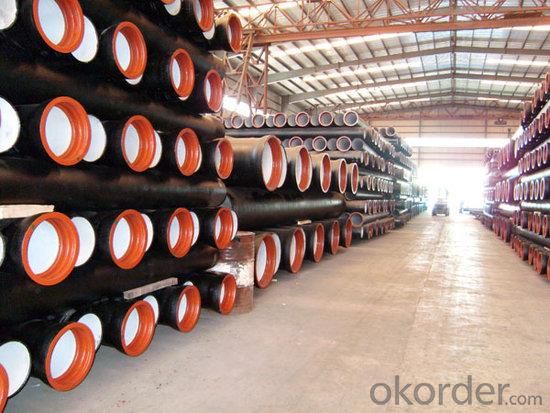
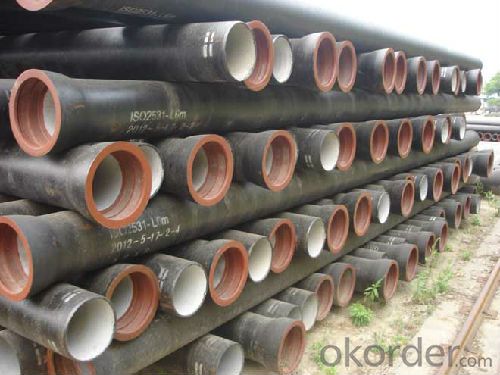
4.Ductile Iron Pipe Specification:
1) The standard of pipe: ISO2531:1998, K9
2) Effective length: 6m
3) Inner cement line: Portland cement line as per ISO4179
4) Zinc coating: at least 130g/m2 as per ISO8179
5) Bitumen painting: at least 70um as per ISO8179
6) With 100% quantity of NBR ring, or SBR ring, or EPDM ring as per ISO4633
7) DN80mm-800mm
5.FAQ:
Here some questions always been asked
1.For Price CIF CFR FOB CPT and so on both ok for us
2.For Delivery we must try us best to send goods to you asap
3.For Package all standard seaworthy package
4.For Payment, T/T L/C which convenience for you will be ok
- Q: Are ductile iron pipes suitable for horizontal directional drilling (HDD) installations?
- Yes, ductile iron pipes are suitable for horizontal directional drilling (HDD) installations. Ductile iron pipes are known for their strength and durability, making them an excellent choice for HDD projects. HDD involves drilling a horizontal hole underground and pulling a pipe through it, which can be challenging due to the forces exerted on the pipe during installation. Ductile iron pipes can withstand these forces and maintain their structural integrity, ensuring a successful HDD installation. Additionally, ductile iron pipes have excellent corrosion resistance, making them suitable for various soil and environmental conditions encountered during HDD projects. Overall, ductile iron pipes offer the necessary characteristics to withstand the rigors of HDD installations and are a reliable choice for such applications.
- Q: How do ductile iron pipes perform in high-altitude areas?
- Due to their inherent strength and durability, ductile iron pipes are highly effective in high-altitude regions. The exceptional properties of ductile iron, such as its high tensile strength and impact resistance, make it ideal for withstanding the challenges presented by high-altitude environments. One significant advantage of ductile iron pipes is their ability to endure both internal and external pressures. In areas with varying water pressure, these pipes can withstand such fluctuations without compromising their structural integrity. This guarantees a consistent and uninterrupted flow of water, eliminating the risk of pipe failures or leaks. Furthermore, ductile iron pipes possess excellent resistance against corrosion, which is crucial in high-altitude areas with unpredictable and harsh atmospheric conditions. The protective lining and external coatings of these pipes provide an additional layer of defense, ensuring their durability and reducing the need for frequent maintenance or replacements. Additionally, ductile iron pipes have a higher tolerance for temperature variations compared to other materials. In high-altitude regions where temperature fluctuations can be extreme, these pipes can withstand expansion and contraction without cracking or rupturing. This thermal stability is vital for maintaining the integrity of the pipeline system and preventing costly repairs. To summarize, ductile iron pipes are an ideal choice for high-altitude areas due to their strength, durability, resistance to pressure variations, corrosion resistance, and thermal stability. These properties make them a reliable option for water distribution systems in such environments, ensuring a continuous water supply without compromising safety or efficiency.
- Q: Comparison of ductile iron pipe and spiral steel pipe
- Can only be used for drainage pipe for comparison, other uses are not mentioned in the same breath.
- Q: How do ductile iron pipes handle soil erosion?
- Ductile iron pipes are renowned for their exceptional strength and durability, rendering them highly resistant to the erosion of soil. The specific engineering of the material used in these pipes ensures their ability to withstand the detrimental effects of soil erosion, thereby guaranteeing long-lasting and dependable infrastructure. The composition of ductile iron pipes comprises a blend of iron, carbon, and other alloying elements, providing the necessary strength and resilience to withstand the forces exerted by soil erosion. These pipes possess a greater tensile strength than conventional cast iron pipes, enabling them to withstand pressure without deforming or cracking. Furthermore, ductile iron pipes boast a protective layer known as cement mortar lining, which acts as a barrier between the pipe and the surrounding soil. This lining offers an additional layer of resistance against corrosion and erosion caused by the chemical composition or abrasive particles present in the soil. Consequently, ductile iron pipes remain intact and continue to function effectively, even in areas experiencing high rates of soil erosion. In terms of installation, ductile iron pipes are specifically designed to be buried underground, ensuring their robust protection from direct contact with the soil. Additionally, their jointing systems are designed to provide secure and watertight connections, minimizing the risk of soil infiltration and subsequent erosion. Overall, ductile iron pipes have a proven track record of effectively combating soil erosion due to their superior strength, protective linings, and appropriate installation techniques. They offer a reliable and long-lasting solution for water and wastewater infrastructure, even in regions prone to soil erosion.
- Q: Are ductile iron pipes resistant to abrasion or wear?
- Yes, ductile iron pipes are highly resistant to abrasion or wear due to their inherent strength and durability.
- Q: How are ductile iron pipes tested for quality assurance?
- Ductile iron pipes are tested for quality assurance through various methods such as hydrostatic testing, visual inspection, and mechanical testing. Hydrostatic testing involves subjecting the pipes to high-pressure water to check for any leaks or weaknesses. Visual inspection is carried out to identify any surface defects or irregularities that may affect the quality of the pipe. Mechanical testing includes conducting tensile strength tests, elongation tests, and hardness tests to ensure that the pipes meet the required standards and can withstand the intended application. These testing procedures help ensure the quality and reliability of ductile iron pipes.
- Q: What is the expected joint deflection of ductile iron pipes?
- The expected joint deflection of ductile iron pipes depends on various factors such as the diameter of the pipe, the type of joint used, and the specific conditions of the installation. In general, ductile iron pipes are designed to accommodate some degree of deflection at the joints to allow for flexibility and movement. The American Water Works Association (AWWA) provides guidelines for the maximum allowable joint deflection for ductile iron pipes. According to AWWA C151/A21.51, the maximum deflection at the joint should typically not exceed 3 degrees or 1% of the nominal pipe diameter, whichever is greater. It is important to note that joint deflection should be within the specified limits to ensure the structural integrity and performance of the pipeline system. Excessive joint deflection can lead to leaks, failures, and reduced lifespan of the pipes. To determine the exact expected joint deflection for a specific installation, it is best to refer to the manufacturer's specifications and guidelines, as they may vary depending on the pipe size, joint type, and other factors. Consulting with a qualified engineer or contacting the manufacturer directly can provide more accurate information tailored to the specific project requirements.
- Q: Can ductile iron pipes be used for fire protection systems?
- Yes, ductile iron pipes can be used for fire protection systems. Ductile iron pipes have excellent strength and durability, making them suitable for carrying water and withstanding the pressure required in fire protection systems. Additionally, they have good corrosion resistance, which is crucial for long-term use in fire protection applications.
- Q: What is the expected leakage rate of ductile iron pipes?
- The expected leakage rate of ductile iron pipes can vary depending on various factors such as the age and condition of the pipes, the quality of installation, and the presence of any external factors that may impact the integrity of the pipes. However, in general, ductile iron pipes are known for their durability and low leakage rates compared to other types of pipes. According to industry standards and studies, the expected leakage rate of well-maintained and properly installed ductile iron pipes is typically less than 0.5 liters per pipe per day (LPPD). This leakage rate is considered acceptable and meets the requirements set by various regulatory bodies and organizations. It is important to note that regular maintenance and inspections are crucial in maintaining the low leakage rate of ductile iron pipes. By identifying and repairing any potential leaks or damages promptly, the overall leakage rate can be effectively minimized. Furthermore, advancements in manufacturing techniques and improvements in pipe design have led to the development of more leak-resistant ductile iron pipes. These pipes may have even lower expected leakage rates than the industry average, further enhancing their overall performance and reliability. Ultimately, while the expected leakage rate of ductile iron pipes can vary, it is generally considered to be low when properly installed and maintained, making them a reliable choice for various water distribution and transmission systems.
- Q: Do ductile iron pipes require special maintenance?
- Indeed, special maintenance is necessary for ductile iron pipes. Despite their reputation for being strong and durable, ductile iron pipes are still vulnerable to specific types of corrosion. To prevent corrosion and extend the pipes' lifespan, regular maintenance is crucial. This maintenance typically involves conducting periodic inspections to identify any signs of corrosion or damage, as well as implementing cleaning and protective coating procedures. Furthermore, it is important to handle and install the pipes correctly to maintain their integrity. By regularly maintaining the pipes and adhering to industry best practices, one can prevent leaks, breaks, and other issues, ultimately saving valuable time and money in the long term.
Send your message to us
Ductile Iron Pipe Class K7/K8/K9 ISO2531
- Loading Port:
- China main port
- Payment Terms:
- TT or LC
- Min Order Qty:
- 1000 m
- Supply Capability:
- 500000 m/month
OKorder Service Pledge
OKorder Financial Service
Similar products
Hot products
Hot Searches
Related keywords
